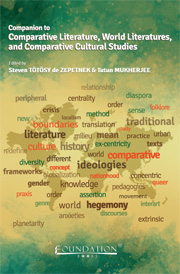Book contents
- Frontmatter
- Contents
- Introduction to the Companion to Comparative Literature, World Literatures, and Comparative Cultural Studies
- PART 1 Theories of Comparative Literature, World Literatures, and Comparative Cultural Studies
- The Contextual Study of Literature and Culture, Globalization, and Digital Humanities
- Comparative Literature and Ex-centricity
- Possibilities and Limits of Comparative Literature Today
- Comparative Cultural Studies and Pedagogy
- Teaching World Literatures
- Comparative Literature and the History of Literature
- Meltzl de Lomnitz, Comparative Literature, and Philosophy
- Comparative Cultural Studies and Cultural Anthropology
- Comparative Literature and Interart Studies
- Gender and Genre in Comparative Literature and (Comparative) Cultural Studies
- Comparative Cultural Studies and Translation Studies
- Comparative Cultural Studies and the Study of Medieval Literature
- Comparative Cultural Studies and Linguistic Hybridities in Literature
- Comparison and Postcoloniality
- (Inter)mediality and the Study of Literature
- PART 2 Comparative Literature in World Languages
- PART 3 Examples of New Work in Comparative Literature, World Literatures, and Comparative Cultural Studies
- PART 4 Multilingual Bibliography of Books in Comparative Literature, World Literatures, and Comparative Cultural Studies
- Index
Meltzl de Lomnitz, Comparative Literature, and Philosophy
from PART 1 - Theories of Comparative Literature, World Literatures, and Comparative Cultural Studies
Published online by Cambridge University Press: 05 April 2014
- Frontmatter
- Contents
- Introduction to the Companion to Comparative Literature, World Literatures, and Comparative Cultural Studies
- PART 1 Theories of Comparative Literature, World Literatures, and Comparative Cultural Studies
- The Contextual Study of Literature and Culture, Globalization, and Digital Humanities
- Comparative Literature and Ex-centricity
- Possibilities and Limits of Comparative Literature Today
- Comparative Cultural Studies and Pedagogy
- Teaching World Literatures
- Comparative Literature and the History of Literature
- Meltzl de Lomnitz, Comparative Literature, and Philosophy
- Comparative Cultural Studies and Cultural Anthropology
- Comparative Literature and Interart Studies
- Gender and Genre in Comparative Literature and (Comparative) Cultural Studies
- Comparative Cultural Studies and Translation Studies
- Comparative Cultural Studies and the Study of Medieval Literature
- Comparative Cultural Studies and Linguistic Hybridities in Literature
- Comparison and Postcoloniality
- (Inter)mediality and the Study of Literature
- PART 2 Comparative Literature in World Languages
- PART 3 Examples of New Work in Comparative Literature, World Literatures, and Comparative Cultural Studies
- PART 4 Multilingual Bibliography of Books in Comparative Literature, World Literatures, and Comparative Cultural Studies
- Index
Summary
Abstract: In his article “Meltzl de Lomnitz, Comparative Literature, and Philosophy” David Marno discusses the importance of Hugó Meltzl de Lomnitz's work. Meltzl de Lomnitz (1846–1908), neglected until recently, has reappeared in discussions of the state of comparative literature at the beginning of the new millennium. The reason behind this new interest in the scholar and editor of the first comparative literature journal in Europe is that his work stands symbolic for a past that the discipline of comparative literature is thought to be able to reclaim. Marno examines both this new interest in Meltzl de Lomnitz and his agenda to suggest that there is a discrepancy between them. Further, Marno argues that what the discipline of comparative literature needs to face is not simply the challenge of its own history, but the aborted project of philosophy of history.
Introduction
In order to initiate a dialogue about the underside of multiculturalism the 2006 report on the situation of the discipline of comparative literature in the U.S., Comparative Literature in an Age of Globalization (Saussy), concentrates on globalization. The previous report—published in 1995 under the title Comparative Literature in the Age of Multiculturalism (Bernheimer)—promoted a future comparative literature as (multi-)cultural studies and to make this point it tended to criticize comparative literature as a historically non-multicultural or not sufficiently multicultural tradition. The 2006 report, by contrast, calls attention to the problems inherent to the idea of comparative literature as (multi-)cultural studies, and looks to comparative literature's past for alternatives.
- Type
- Chapter
- Information
- Companion to Comparative Literature, World Literatures, and Comparative Cultural Studies , pp. 100 - 111Publisher: Foundation BooksPrint publication year: 2014

